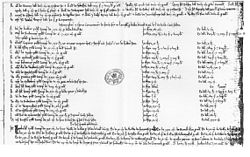| Pipe rolls | |
|---|---|
 Extract from the 1194 Pipe roll | |
| Language | Medieval Latin, Middle English, English |
| Date | 1129–1833 |
| Provenance | English Exchequer Exchequer of Ireland |
| Series | Pipe rolls |
| Genre | Accounting documents |
| Subject | Records of the audits of the English Exchequer and Exchequer of Ireland |
| Period covered | 1130–1833 |
The Pipe rolls, sometimes called the Great rolls[1] or the Great Rolls of the Pipe, are a collection of financial records maintained by the English Exchequer, or Treasury, and its successors, as well as the Exchequer of Ireland. The earliest date from the 12th century, and the series extends, mostly complete, from then until 1833.[2] They form the oldest continuous series of records concerning English governance kept by the English, British, Irish and United Kingdom governments, covering a span of about 700 years. The early medieval ones are especially useful for historical study, as they are some of the earliest financial records available from the Middle Ages. A similar set of records was developed for Normandy, which was ruled by the English kings from 1066 to 1205, but the Norman Pipe rolls have not survived in a continuous series like the English.
They were the records of the yearly audits performed by the Exchequer of the accounts and payments presented to the Treasury by the sheriffs and other royal officials; and owed their name to the shape they took, as the various sheets were affixed to each other and then rolled into a tight roll, resembling a pipe, for storage. They record not only payments made to the government, but debts owed to the crown and disbursements made by royal officials. Although they recorded much of the royal income, they did not record all types of income, nor did they record all expenditures, so they are not strictly speaking a budget. The Pipe Roll Society, formed in 1883, has published the Pipe rolls for the period up to 1224.